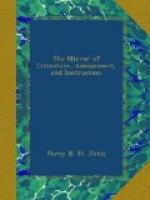and beautiful. There is an eloquent charm which,
while it touches the chords of truth, makes the heart
respond to the tale. The raven would find sufficient
for its carnivorous appetite in the floatage of the
animal remains, on the briny flood, and would return
to roost on the ark; but it was far different with
Noah’s bird, so long as the waters prevailed,
there could be no pause for her weary wing, and the
messenger would return to the ark. So soon, however,
as the subsidence of the waters had permitted the
olive to emerge, a sprig was plucked off, and borne
to the patriarch in triumph. Emphatic symbol
of peace! Commemorated through ages, it is still
the symbol of peace. Along with the fig tree and
vine, it is associated, as the emblem of man’s
inheritance, and in the geography of its locality,
the patriarch would hail the plain on which it flourished,
and from which it was borne, as the place of his former
abode. The dove would return, though the olive
had emerged, because no food had as yet been provided.
How long this ambassador of peace was absent, we cannot
tell: we are only informed that the dove returned
in the evening. If the winged messenger
was despatched early in the day, it is not improbable
that the delightful trophy was obtained from Mount
Olivet, where, according to the late Dr. Clarke, ’the
olive still vindicates its parental soil.’
In considering the question of the geographical distribution
of plants, this would likely be the nearest olive
plane from the mountains of Armenia. It may be
remarked also, that the olive remarkably synchronizes
with the habits of the dove; since, according to Dr.
Chandler, in his Travels in Greece, as soon as the
olive matures its berries, vast numbers of doves, among
other birds, repair for food to the olive groves.
It cannot be irrelevant to remind our readers of the
habits of the columba tabellaria, or the carrier
pigeon, so called from the office to which it has been
applied, viz. that of carrying letters, in the
Levant, &c. Those of Mesopotamia are the most
famous in the world, and the Babylonian carrier pigeon
is employed even on ordinary occasions at Bagdad.
The geographical locality, therefore, of the carrier
pigeon, it is interesting to remember, is in the vicinity
of those very mountains where the ark finally rested.
With us the carrier pigeon is an exotic, and is now
acclimated, or naturalized. Carrier pigeons fly
at the rate of fifty miles an hour.—’Napoleon,’
the name of one of the carrier pigeons which was despatched
from London a short time ago, at four o’clock
A.M., reached Liege, in France, about ten o’clock
in the day. Mr. Audubon states his having shot
the passenger pigeon (columba migratoria) in
America, and found in its stomach, rice, which
could not have been obtained within a distance of
eight hundred miles.”
Parable of the Good Samaritan.




